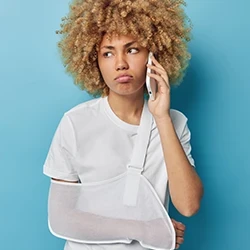Coping with a serious injury away from home can be incredibly challenging, leaving you feeling alone and overwhelmed.
As a legal attorney, I have worked with many clients who have faced this difficult situation, and I want to share my expertise to help you through it.
In this article, I'll provide practical advice on how to cope with a serious injury while away from home and find the support you need to recover.
Quick Summary
- Seeking immediate medical attention is crucial when dealing with a serious injury away from home. It's also essential to research local healthcare options and connect with friends and family for emotional support.
- To support your recovery while away from home, establish routines, practice relaxation techniques, exercise regularly, seek professional care, and connect with supportive people.
- Keeping all relevant documents and records and taking your medical treatment can help build a strong legal case for recovery.
How To Cope With A Serious Injury Away From Home?

1. Seek Immediate Medical Attention

2. Assess The Damage
It is advisable to call the police and request a report, even if nobody appears injured. This report will provide an impartial evaluation of the incident and will be useful in insurance investigations.To assist your lawyer with your case, please take clear pictures of the damage to the vehicles, the accident scene, and any other relevant details of the crash [1].
3. Call Your Insurance Company

4. Call A Personal Injury Attorney
You should contact a personal injury lawyer who practices law in the state of your accident to receive appropriate legal guidance and understanding of local laws.To ensure your legal rights are protected, it is recommended that you contact a car accident lawyer as soon as possible. Each state has different time limits for filing a lawsuit, known as statutes of limitation, so it is crucial to act promptly [2].
"Emotional distress can happen before and after a disaster. Coping strategies include preparation, self-care, and identifying support systems."
- The Substance Abuse and Mental Health Services Administration (SAMHSA)
Ways To Support Your Recovery While You're Not at Home

- Feelings of disbelief, fear, shock, anger, sadness, worry, numbness, or frustration
- Physical reactions like headaches, body pains, stomach problems, and skin rashes
- Aggravation of mental health conditions
These symptoms can be managed by focusing on self-care and connecting with supportive people. Below are some tips to help you cope:
- Reach out for support: Spend time with family, friends, support groups, or a therapist who can provide emotional support and relieve stress.
- Practice Relaxation: Techniques like deep breathing, yoga, meditation, mindfulness exercises, and progressive muscle relaxation.
- Exercise Regularly: Regular physical exercise can help when you experience emotional distress.
- Seek Professional Care: Connect with a mental health provider specializing in psychological trauma recovery to address any underlying mental and emotional issues that may impact your overall mental health.
- Establish Routines: Setting daily goals and habits can give structure and routine to your life. Put major life decisions on hold and focus on your self-care.
Certain injuries may result in long-term harm, leading to chronic pain that can worsen. However, working closely with your attorney and medical professionals can improve your chances of successful recovery. To achieve this, consider the following:
- Keep all documents and records – Retain copies of medical records, work reports, and property damage information to help your lawyer build a strong case for recovery.
- Take your medical treatment seriously – Failing to follow doctor's orders can harm your physical recovery and reduce financial damages.
See all related personal injury and accident lawsuits our attorneys covered so far.
FAQs
How Can You Deal With Serious Injuries?You can deal with serious injuries by seeking medical attention immediately and following your doctor's orders for physical and emotional injuries. Additionally, it's important to consult with a legal professional to protect your rights. They can help you navigate the legal system, obtain compensation for your injuries, and get the support you need to recover.How Do You Comfort Someone After An Injury?You comfort someone after an injury by offering emotional support and comfort. Listen to them without judgment, validate their feelings, and show empathy. Offer practical assistance, such as helping with household chores or running errands. How can an attorney assist with an injury case away from home?
An attorney can help by gathering evidence, filing the lawsuit, negotiating with defendants, and representing you in court. They can navigate jurisdictional issues and ensure your rights are protected throughout the process.
Need Help From A Personal Injury Attorney?
Coping with a serious injury or traumatic event can be a challenging and overwhelming experience. However, seeking professional help and support can make all the difference in your recovery.At Schmidt & Clark, LLP we understand the difficulties of these situations. We are committed to helping our clients navigate the legal system, obtain compensation for their injuries, and get the support they need to heal. Contact us today for a free case evaluation and to learn more about how we can assist you in your time of need.
References:
- https://www.insurance.ca.gov/01-consumers/105-type/95-guides/01-auto/hadaccident.cfm
- https://www.courts.ca.gov/9618.htm?rdeLocaleAttr=en

 Published by
Published by